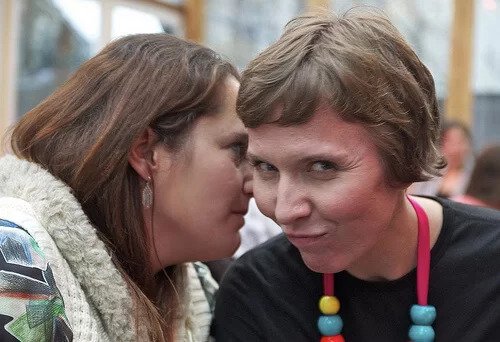Love & Dating
How to Stop Judging People
We live in a world where judgment seems to be an inherent part of human nature. From how people dress, talk, or behave to their beliefs, choices, and actions, we often make quick assessments and form opinions about others.
However, passing judgment can have negative consequences, both for the person being judged and the person doing the judging. It can create conflict, harm relationships, and foster a culture of divisiveness and intolerance.
So, how can we stop judging people and embrace compassion and empathy for a better world? This blog post will explore practical ways to overcome judgmental tendencies and cultivate a more accepting and understanding mindset.
Ways to Stop Judging People
1. Practice self-awareness:
The first step in stopping judgment is to develop self-awareness. Understanding that judgment often stems from our biases, experiences, and beliefs is essential. Reflect on your thoughts, feelings, and reactions when you encounter someone who is different from you or holds opposing views.
Are you quick to make assumptions or jump to conclusions? Are you projecting your own insecurities or biases onto others? By becoming more self-aware, you can catch yourself in the act of judging and take a moment to pause and reflect before reacting.
2. Challenge your assumptions:
We all tend to make assumptions about others based on limited information or stereotypes. However, assumptions can be misleading and perpetuate unfair judgments.
Challenge your assumptions by seeking to understand others with an open mind. Engage in meaningful conversations, ask questions, and listen attentively without interrupting or forming opinions prematurely. Be willing to consider different perspectives and be open to the possibility that your assumptions may be wrong.
3. Cultivate empathy:
Empathy is the ability to understand and share the feelings of others. Cultivating empathy can help us see things from others’ perspectives and foster compassion instead of judgment. Put yourself in others’ shoes and try understanding their background, experiences, and motivations. Recognize that everyone has their own unique story, struggles, and challenges. Practice empathy by showing kindness, compassion, and understanding toward others, regardless of their differences or beliefs.
4. Practice mindfulness:
Mindfulness is the practice of being fully present at the moment without judgment. By developing mindfulness, we can become more aware of our thoughts, feelings, and reactions when encountering others. Notice when judgmental thoughts arise and let them go without acting on them. Instead of dwelling on negative thoughts, redirect your focus to the present moment and engage in positive and constructive actions. Mindfulness can also help you become more attuned to your emotions and underlying triggers that may contribute to judgmental tendencies.
ALSO, READ Emotional Flashbacks & Triggers
5. Cultivate a growth mindset:
A growth mindset believes that we can continuously learn, grow, and evolve as individuals. Embrace the idea that everyone can change and improve, including ourselves and others. Instead of labeling people based on their current behavior or beliefs, see them as individuals on their unique journey of growth and development. Be willing to offer support, encouragement, and understanding, and be open to learning from others. A growth mindset can foster a culture of acceptance, tolerance, and understanding.
6. Practice gratitude:
Gratitude is the practice of recognizing and appreciating the positive aspects of life. By practicing gratitude, we can shift our focus from judgment to appreciation. Instead of dwelling on what we perceive as unfavorable or lacking in others, we can acknowledge and appreciate their positive qualities, strengths, and contributions. Gratitude can also help us develop a more positive and compassionate mindset toward ourselves and others.
7. Practice Active Listening:
Listening is an essential communication skill, and active listening involves giving the speaker our full attention without interrupting or forming judgments. It’s important to listen with an open mind and not jump to conclusions or assumptions about what the other person is saying. By truly hearing others and validating their experiences and perspectives, we can foster understanding and reduce judgment.
8. Reflect on Our Own Biases:
We all have conscious or unconscious biases that influence our perceptions and judgments of others. Reflecting on and acknowledging our biases is an essential step toward reducing judgment. It’s important to be honest with ourselves and examine our thoughts and feelings towards others with self-awareness and self-reflection.
9. Practice Kindness and Compassion:
Kindness and compassion are potent antidotes to judgment. By consciously choosing to be kind and compassionate towards others, we can create a positive ripple effect in our interactions and relationships. Simple acts of kindness, such as offering a smile, a helping hand, or a kind word, can go a long way in fostering understanding and empathy.
10. Focus on Common Humanity:
We all have strengths, weaknesses, fears, and aspirations. Recognizing our shared humanity can help us connect with others on a deeper level and foster empathy and understanding. Instead of focusing on differences, try to find common ground and share experiences with others, which can help bridge gaps and reduce judgment.
11. Educate Ourselves:
Ignorance often breeds judgment. Educating ourselves about different cultures, backgrounds, beliefs, and perspectives can help us better understand the world and its diverse inhabitants. It’s essential to seek out diverse sources of information and engage in open-minded learning to expand our knowledge and reduce ignorance-based judgments.
Conclusion
In summary, stopping judgment is a conscious choice that requires effort and practice. It involves embracing empathy, practicing active listening, challenging our biases, and treating others with kindness and respect. Doing so can create a more inclusive and compassionate society where everyone feels valued and accepted for who they are. Let’s strive to be non-judgmental and contribute towards a more harmonious world.
ALSO, READ HOW TO STOP BEING A PEOPLE PLEASER
Originally posted 2023-04-21 06:22:12.












